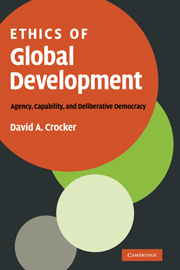Book contents
- Frontmatter
- Contents
- List of figures
- Acknowledgments
- 1 Introduction
- Part I Development ethics
- Part II The capability approach: ethical foundations
- Part III Strengthening and applying the capability approach
- 7 Agency, responsibility, and consumption
- 8 Hunger, capability, and agency-oriented development
- Part IV Deliberative democracy, participation, and globalization
- Index of names
- Index of subjects
7 - Agency, responsibility, and consumption
Published online by Cambridge University Press: 22 September 2009
- Frontmatter
- Contents
- List of figures
- Acknowledgments
- 1 Introduction
- Part I Development ethics
- Part II The capability approach: ethical foundations
- Part III Strengthening and applying the capability approach
- 7 Agency, responsibility, and consumption
- 8 Hunger, capability, and agency-oriented development
- Part IV Deliberative democracy, participation, and globalization
- Index of names
- Index of subjects
Summary
If development ethics is to be more than an academic exercise, it must confront urgent human problems. Sometimes the ethicist begins with moral dilemmas and searches for relevant ethical principles. Sometimes the ethicist applies to a new quandary principles that have proven helpful in grasping and resolving other moral issues or dilemmas.
The list of urgent practical challenges is lengthy, but at or near the top would be those challenges addressed in the next two chapters: over‐consumption and hunger. Many lives go very badly because some people in both the South and the North consume too much or the wrong kind of goods and services. One result is climate change, which endangers the planet and all its inhabitants. Others in both the North and the South suffer and even die from lack of food and other necessities. Moreover, in a globalizing world, that some have more than they need is sometimes the cause of others having much less than they need to have the real opportunity for at least a minimally adequate life.
The two chapters of Part III are efforts to understand and provide a normative – yet policy-relevant – framework to help understand and resolve these problems of over-consumption and under-consumption, such as hunger.
- Type
- Chapter
- Information
- Ethics of Global DevelopmentAgency, Capability, and Deliberative Democracy, pp. 217 - 254Publisher: Cambridge University PressPrint publication year: 2008

